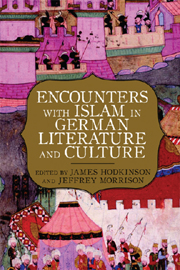Book contents
- Frontmatter
- Contents
- Acknowledgments
- Introduction
- 1 “cristen, ketzer, heiden, jüden”: Questions of Identity in the Middle Ages
- 2 Wolfram von Eschenbach, Islam, and the Crusades
- 3 Perverted Spaces: Boundary Negotiations in Early-Modern Turcica
- 4 Enlightenment Encounters the Islamic and Arabic Worlds: The German “Missing Link” in Said's Orientalist Narrative (Meiners and Herder)
- 5 Goethe, Islam, and the Orient: The Impetus for and Mode of Cultural Encounter in the West-östlicher Divan
- 6 Moving beyond the Binary? Christian-Islamic Encounters and Gender in the Thought and Literature of German Romanticism
- 7 Forms of Encounter with Islam around 1800: The Cases of Johann Hermann von Riedesel and Johann Ludwig Burckhardt
- 8 Displacing Orientalism: Ottoman Jihad, German Imperialism, and the Armenian Genocide
- 9 German-Islamic Literary Interperceptions in Works by Emily Ruete and Emine Sevgi Özdamar
- 10 Dialogues with Islam in the Writings of (Turkish-)German Intellectuals: A Historical Turn?
- 11 Michaela Mihriban Özelsel's Pilgrimage to Mecca: A Journey to Her Inner Self
- 12 Intimacies both Sacred and Profane: Islam in the Work of Emine Sevgi Özdamar, Zafer Şnocak, and Feridun Zaimoğlu
- 13 Encountering Islam at Its Roots: Ilija Trojanow's Zu den heiligen Quellen des Islam
- 14 The Lure of the Loser: On Hans Magnus Enzensberger's Schreckens Männer and Ian Buruma's Murder in Amsterdam
- Notes on the Contributors
- Index
13 - Encountering Islam at Its Roots: Ilija Trojanow's Zu den heiligen Quellen des Islam
Published online by Cambridge University Press: 05 February 2013
- Frontmatter
- Contents
- Acknowledgments
- Introduction
- 1 “cristen, ketzer, heiden, jüden”: Questions of Identity in the Middle Ages
- 2 Wolfram von Eschenbach, Islam, and the Crusades
- 3 Perverted Spaces: Boundary Negotiations in Early-Modern Turcica
- 4 Enlightenment Encounters the Islamic and Arabic Worlds: The German “Missing Link” in Said's Orientalist Narrative (Meiners and Herder)
- 5 Goethe, Islam, and the Orient: The Impetus for and Mode of Cultural Encounter in the West-östlicher Divan
- 6 Moving beyond the Binary? Christian-Islamic Encounters and Gender in the Thought and Literature of German Romanticism
- 7 Forms of Encounter with Islam around 1800: The Cases of Johann Hermann von Riedesel and Johann Ludwig Burckhardt
- 8 Displacing Orientalism: Ottoman Jihad, German Imperialism, and the Armenian Genocide
- 9 German-Islamic Literary Interperceptions in Works by Emily Ruete and Emine Sevgi Özdamar
- 10 Dialogues with Islam in the Writings of (Turkish-)German Intellectuals: A Historical Turn?
- 11 Michaela Mihriban Özelsel's Pilgrimage to Mecca: A Journey to Her Inner Self
- 12 Intimacies both Sacred and Profane: Islam in the Work of Emine Sevgi Özdamar, Zafer Şnocak, and Feridun Zaimoğlu
- 13 Encountering Islam at Its Roots: Ilija Trojanow's Zu den heiligen Quellen des Islam
- 14 The Lure of the Loser: On Hans Magnus Enzensberger's Schreckens Männer and Ian Buruma's Murder in Amsterdam
- Notes on the Contributors
- Index
Summary
WHILE MUSLIMS HAVE INCREASINGLY BEEN MOVING to Europe and not least Germany over the last few decades, bringing with them various denominations of their faith, another journey is at the center of every Muslim's life: the hajj, the annual pilgrimage to Mecca and Medina in the month of Dhu al-Hijjah. This journey constitutes one of the five pillars of Islam; the others are the shahada (witnessing the oneness of God and the prophethood of Mohammed), salat (regular observance of the five prescribed daily prayers), paying zakah (almsgiving), and sawm or siyyam (fasting during the month of Ramadan). Like the other pillars of Islam, the hajj is part of every Muslim's duty as a religious individual and has to be carried out at least once in his/her lifetime, if sufficient finances and good health allow it. This journey is a particularly Islamic way of traveling, as it celebrates Muslim belief in Islam's “homeland” and reinforces the pilgrim's feeling of belonging to the Muslim community, the umma. The pilgrimage is justified historically: the Prophet Mohammed emigrated from Mecca to Medina in 622 because he had to flee persecution by the Meccan aristocracy; this event is referred to as hijra. In Medina he established the first Muslim community, which, from then on, was to be known as the umma. Although the pilgrimage to Mecca and Medina is an essentially communal form of traveling, it also makes each traveler reflect upon his/her individual identity as Muslim.
- Type
- Chapter
- Information
- Encounters with Islam in German Literature and Culture , pp. 236 - 246Publisher: Boydell & BrewerPrint publication year: 2009

